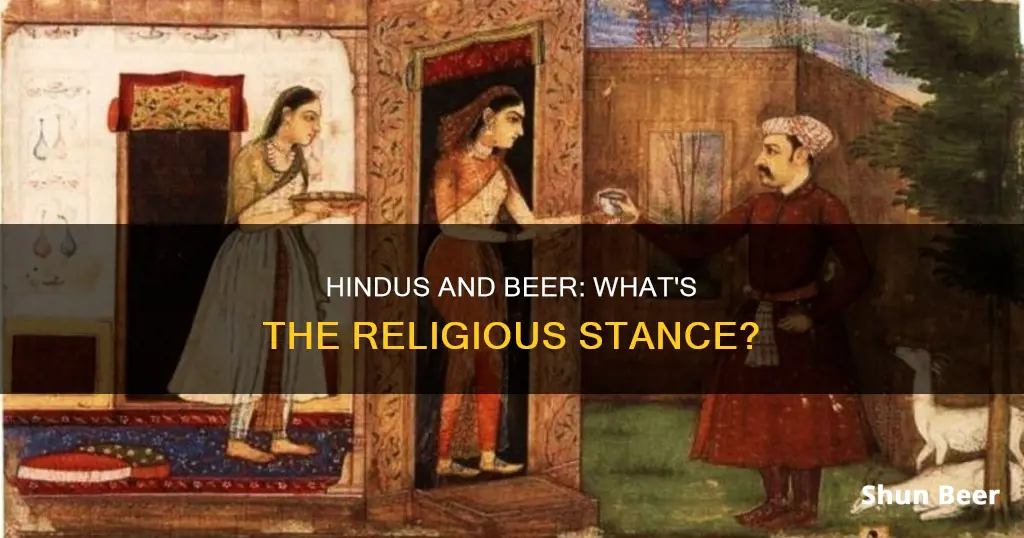
Alcohol consumption in Hinduism is a complex and multifaceted topic, with no clear consensus among the vast texts and traditions of the religion. While some Hindus do drink alcohol, others abstain from it completely. The decision to consume alcohol is often influenced by cultural factors, with Hindus in conservative areas being less likely to drink, while those in liberal communities may incorporate moderate social drinking into their lives.
Hindu scriptures present differing views on alcohol consumption. Some texts indicate the drinking of wine among the gods, while others forbid it, describing alcohol as a substance detrimental to one's physical and spiritual health. The Manusmriti, for instance, states that there is no fault in eating meat, in drinking liquor, or in having sex; that is the natural activity of creatures. Abstaining from such activity, however, brings greatest rewards. This highlights the complex and varied nature of Hindu scriptures when it comes to alcohol consumption.
Different Hindu denominations also have varying stances on alcohol. Vaishnavism, for example, generally forbids alcohol consumption, while Shaivism and Smartism include different recommendations based on their subsets, with some permitting occasional drinking and others advising against it entirely.
In conclusion, the topic of alcohol consumption among Hindus is a diverse and nuanced subject, influenced by cultural context, individual choices, and the interpretation of sacred texts. While some Hindus may consume alcohol in moderation, others abstain completely, and the decision is often shaped by their specific denomination and personal beliefs.
| Characteristics | Values |
|---|---|
| Religious texts | Some religious texts forbid alcohol consumption, while others indicate the drinking of wine among Hindus. |
| Culture | Hindus influenced by their surrounding cultures. Hindus who are more conservative, and live in more conservative areas, are less likely to consume alcohol. Hindus who live in more liberal communities, where drinking alcohol is very common, are more likely to incorporate moderate social drinking into their lives. |
| Monastic vows | Hindus who have taken monastic vows, in a variety of Hindu monastic traditions, are generally forbidden from drinking alcohol. |
| Denominations | Some denominations are more wary of alcohol than others. Followers of Vaishnavism Hinduism generally consider alcohol forbidden, while Shaivism or Smartism include different recommendations based on subsets, some of which permit the occasional drinking of alcohol, and others which advise against it entirely. |
| Rituals and medicine | Alcohol is used in certain Hindu rituals and Ayurvedic medicine. |
| General recommendations | Most Hindu denominations do not recommend the consumption of alcohol, and most followers understand drinking to be something that is optional in moderation or best avoided altogether. |
What You'll Learn

Alcohol is allowed in some Hindu sects
Hinduism is a diverse religion with many different sects and interpretations of religious texts. While some sects forbid the consumption of alcohol, others permit it, and still, others include it in their rituals and ceremonies.
For instance, the followers of Vaishnavism Hinduism generally consider alcohol consumption forbidden. On the other hand, sects like Shaivism or Smartism have different recommendations based on their various subsets, with some permitting occasional drinking, while others advise against it entirely.
Hindu scriptures themselves present conflicting perspectives on alcohol. Some scriptures describe alcohol as a substance that can negatively affect one's physical and spiritual health, while others mention the drinking of wine among the gods and humans. For example, the Garuda Purana states:
> Used judiciously, wine relieves a person of worries; otherwise, it leads one to hell (through excessive use). It gives the ability to work, helps the natural functions, and blesses with beauty. Judicious use of wine is like that of the nectar of immortality.
Furthermore, Tantric Hinduism, which includes some of the more esoteric Hindu beliefs, allows for the consumption of alcohol as Prasadam, meaning it is first offered to the gods as Naivedyam. Additionally, the Brahmanda Purana includes a dialogue between Indra and Sage Brihasapati about liquor, indicating a level of acceptance, or at least acknowledgment, of alcohol within this sect.
The Manusmriti, a key text outlining norms and codes of conduct, also presents conflicting messages. While it states that drinking alcohol is one of the biggest sins, it also mentions that there is no fault in drinking liquor, and abstenance only brings greater rewards.
The consumption of alcohol in Hinduism is also influenced by factors such as caste and gender. For example, Brahmins, who are typically forbidden from drinking, may face different restrictions than those from other Varnas. Similarly, there are specific guidelines for widows, virgins, and women in their menstrual period, with drinking generally discouraged for these groups.
Overall, while some Hindu sects do allow for alcohol consumption, the general recommendation is that drinking is optional in moderation or best avoided altogether. Hindus in certain sects or those committed to strict adherence to Hindu recommendations on food and drink will abstain from alcohol.
Beer and Keto: Weight Loss Friend or Foe?
You may want to see also

Alcohol is forbidden in Hinduism
Hinduism does not have a central authority, but religious texts generally discourage the use or consumption of alcohol. Brahmins are forbidden from drinking alcohol, but some scriptures say that people from the other three Varnas can do so.
In the Śruti texts, such as the Vedas and Upanishads, strong alcohol consumption or intoxication is considered a recipe for sinfulness, weakness, failure, and violent behaviour. In the Chandogya Upanishad, drinking alcohol is described as one of the five biggest sins.
In the Smriti texts, which are considered less authoritative than the Śruti texts, the verses encourage the use of alcohol but remind that abstention is better. In the Manusmriti, a text outlining the norms and codes of conduct for various social classes, different regulations are prescribed for alcohol consumption among castes. While the Kshatriya caste, comprising warriors and rulers, is allowed to consume alcohol in moderation as part of their social and ceremonial functions, the Brahmin caste, consisting of priests, scholars, and teachers, is generally discouraged from consuming alcohol due to their spiritual and religious responsibilities.
Some Hindu sects forbid alcohol consumption, and most Hindu denominations will not recommend it. Hindus who have taken monastic vows are generally forbidden from drinking alcohol.
Alcohol is considered to be detrimental to both physical and spiritual health, impairing one's ability to reason and make decisions. It can also produce depression, disorientation, and memory loss.
While alcohol is forbidden in Hinduism, there are practices within the religion that utilise it. For example, Ayurveda medicine uses alcohol in certain medicinal practices, and Tantric Hindu practices use alcohol in certain rites and rituals.
Tequila and Beer: Mixing Alcohol Safely
You may want to see also

Alcohol is allowed in Tantric Hinduism
Tantric Hinduism allows consuming alcohol as "Prasadam", meaning it is first offered to the gods as "Naivedyam". The Garuda Purana states that wine, when used judiciously, relieves a person of worries and helps with work and natural functions. However, excessive use leads to hell. The Brahmanda Purana also discusses liquor, and the Manusmriti states that there is no sin in wine, although abstention is rewarded.
Tantra is a complex and secretive subject, and its practices are not meant for the common man. It is a difficult path that requires a clean conscience, control over the senses, and a mind fixed on Brahman, the ultimate reality. The use of alcohol in Tantric Hinduism is part of rituals and pujas, often including fierce deities and ritual possession. These practices are seen as a way to expand one's consciousness through bliss.
Liver Biopsy: Drinking Beer, Safe or Not?
You may want to see also

Alcohol is used in Hindu rituals and medicine
Some Tantric Hindu practices, which include some of the more esoteric manifestations of Hindu beliefs, use alcohol in certain rites and rituals. Tantra worshippers see more spiritual potential in alcohol than other Hindus but understand its spiritual role to be restricted to its use in regulated rituals guided by religious leaders.
There is debate over whether the soma drink described in the Vedas, derived from the juice of the soma plant and considered to have magical properties, is a fermented drink. The drink, which plays a role in several Hindu religious stories, is described as being enjoyed by various Hindu deities and able to confer immortality on those who sample it.
In ancient India, references to the use of intoxicants can be found in the Vedas, the Great Epics, and ancient Tamil literature. Elaborate rules for the preparation of the soma drink can be found in the Rig Veda, with most precise directions for its creation.
Heart Monitor and Beer: Is It Safe?
You may want to see also

Alcohol is not encouraged in Hinduism
Hinduism, also referred to as Sanatana Dharma, or the "eternal dharma", is a religion and a "way of life". It is the oldest living religion in the world, with over a billion followers practising it in many different ways. Therefore, there is no single consensus within Hinduism on whether or not Hindus should drink alcohol.
Some Hindu scriptures support alcohol consumption, such as the Garuda Purana, which states:
> Used judiciously, wine relieves a person of worries; otherwise, it leads one to hell (through excessive use). It gives the ability to work, helps the natural functions, and blesses with beauty. Judicious use of wine is like that of the nectar of immortality.
The Manusmriti, a key text outlining the norms and codes of conduct for various social classes, also supports alcohol consumption:
> There is no sin in the eating of meat, nor in wine, nor in sexual intercourse. Such is the natural way of living beings; but abstention is conducive to great rewards.
However, other Hindu scriptures forbid alcohol consumption, describing it as one of the biggest sins. For example, the Chandogya Upanishad states:
> A person who steals gold, or drinks liquor, or goes to bed with his teacher's wife, or kills a Brahmin—these four are lost. Also lost is the fifth—one who keeps company with such people.
The Manusmriti also includes verses that forbid alcohol consumption:
> Killing a Brahmin, drinking (the spirituous liquor called) Sura, stealing (the gold of a Brahmin), adultery with a Guru's wife, and associating with such (offenders), they declare (to be) mortal sins (mahapataka).
In addition, Brahmins, the highest-ranking caste who are religious leaders, are forbidden from drinking alcohol. This prohibition also extends to other upper-caste groups who are strict vegetarians.
While there is no clear consensus on alcohol consumption within Hinduism, it is generally not encouraged. Most Hindu denominations do not recommend the consumption of alcohol, and followers understand that drinking is optional and should be done in moderation or avoided altogether. Alcohol is not considered to have religious value in Hinduism, and it is not used just to get drunk. Instead, it is used in certain rituals and Ayurvedic medicine.
Overall, while some Hindus may drink alcohol, the majority view it as something that is not encouraged in their religion.
Beer and Lithium: What's the Verdict?
You may want to see also
Frequently asked questions
There is no clear consensus within Hinduism on whether or not Hindus should drink alcohol. Some Hindus do, and some don't.
Some scriptures forbid alcohol consumption, while others mention the drinking of wine among Hindus.
Yes, some are more wary of alcohol than others. For example, followers of Vaishnavism Hinduism generally consider alcohol forbidden, while Shaivism or Smartism include different recommendations based on their subsets.
Yes, alcohol is used in certain Tantric Hindu practices and rituals, and in some Shrauta rituals.
Most Hindu denominations do not recommend the consumption of alcohol. Most followers understand drinking to be something that is optional in moderation or best avoided altogether.







